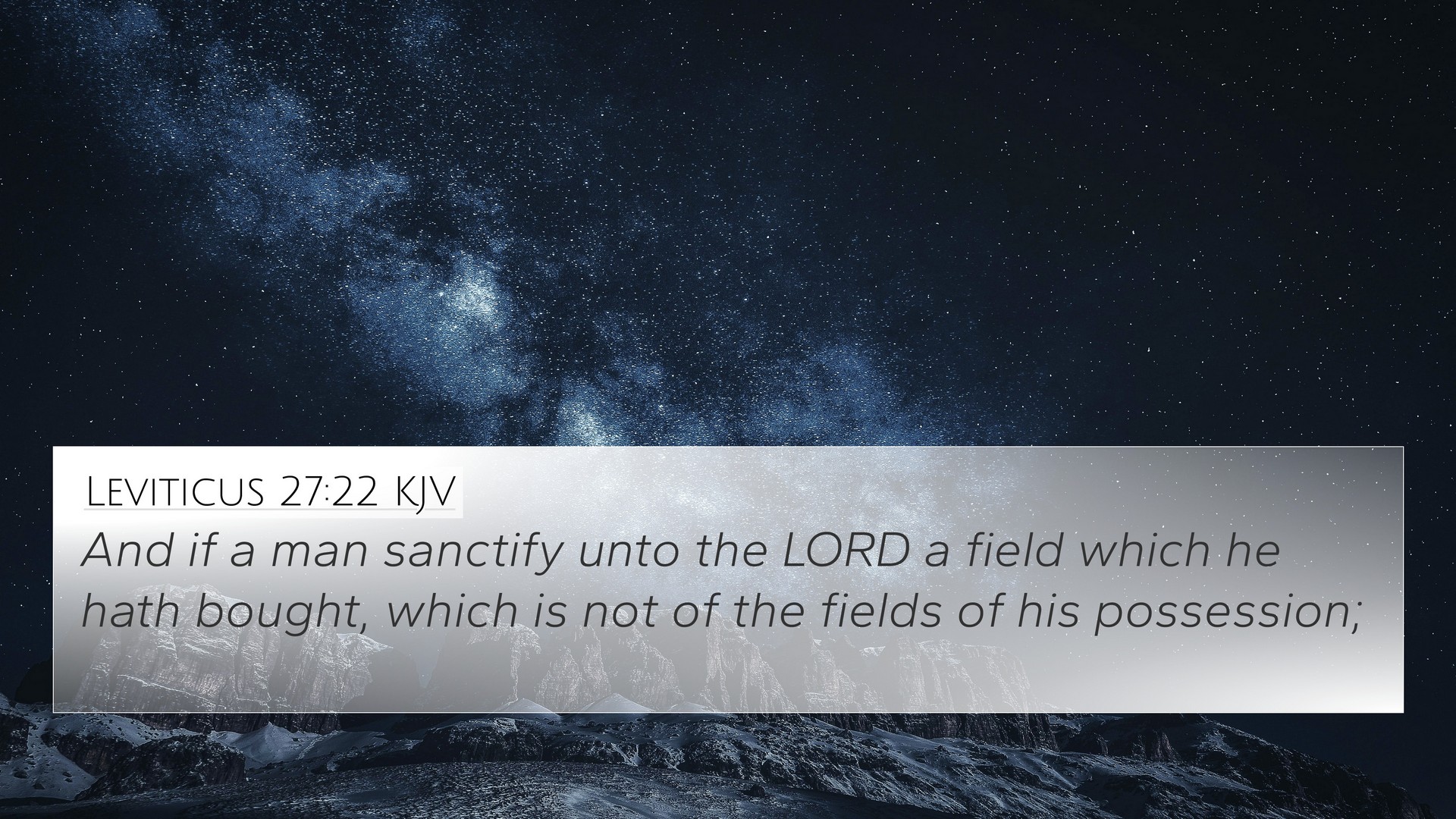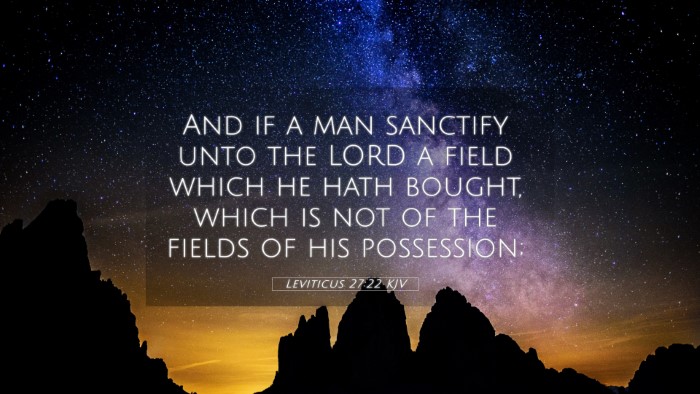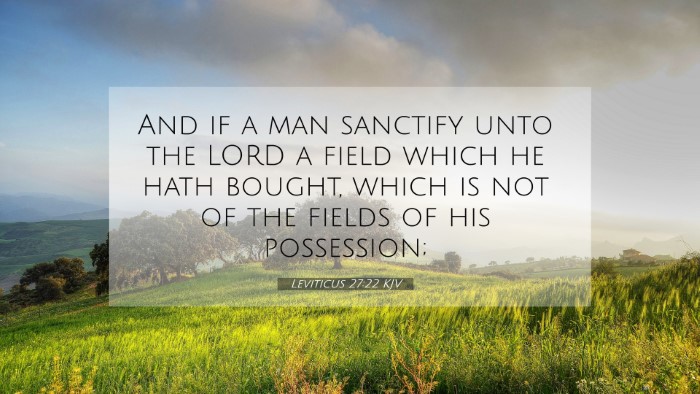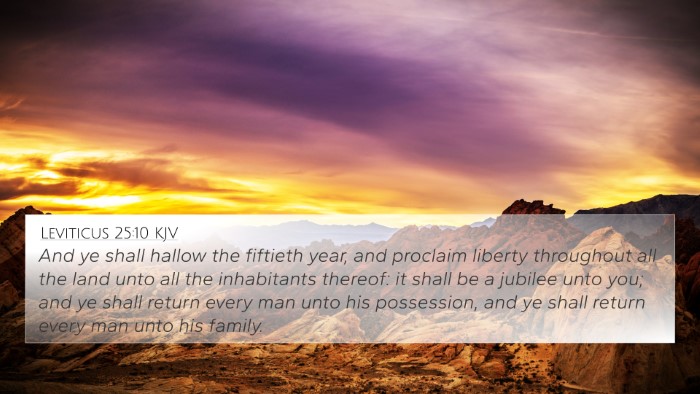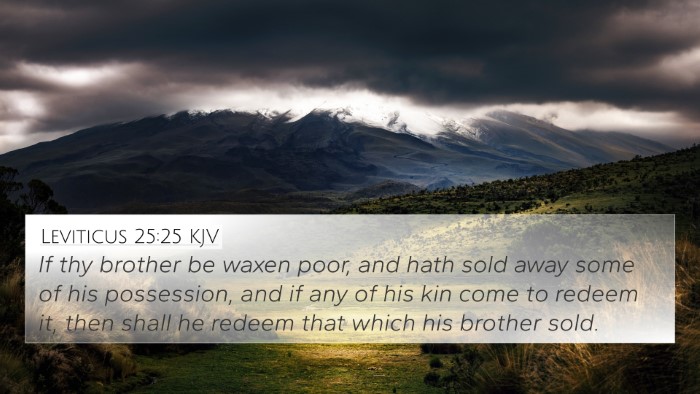Understanding Leviticus 27:22
Leviticus 27:22 states: "And if it be a field which he hath purchased, which is not of the fields of his possession;" This verse deals with the regulation regarding vows and the valuation of land that is acquired by purchase rather than inherited.
Meaning and Interpretation
This verse is part of a larger framework in Leviticus that outlines how Israelites were to handle vows and offerings to the Lord. The specific context addresses the circumstances under which fields are dedicated to God and how they are to be valued.
Insights from Public Domain Commentaries
Various commentaries provide valuable insights into this verse, including:
- Matthew Henry: He suggests that this law illustrates God's claim over all property, regardless of its origin. It reinforces that all possessions ultimately belong to God, and proper stewardship is required.
- Albert Barnes: Barnes discusses the distinction between inherited fields and those purchased. He notes that the valuation of purchased fields has specific regulations due to their nature of being acquired through monetary transactions rather than familial lineage.
- Adam Clarke: Clarke emphasizes that the laws surrounding dedicating fields serve to regulate the economic interactions of the Israelites and promote social equity among the community members.
Cross-Referencing Biblical Texts
Leviticus 27:22 connects with several other scriptures, enhancing its theological richness through cross-references:
- Numbers 18:14 - This passage addresses the rights of the priests regarding what is dedicated to the Lord.
- Deuteronomy 12:6 - This verse emphasizes the importance of bringing offerings to the places designated by God.
- 1 Chronicles 29:3 - King David's desire to dedicate his own possessions for the temple highlights the significance of individual contributions towards God's work.
- Matthew 5:16 - The principle of letting one's light shine can be seen as a parallel to presenting one’s acts of dedication to God.
- Luke 16:11 - A reminder of the faithful management of earthly resources as a reflection of one's devotion.
- Malachi 3:10 - This scripture calls for bringing the whole tithe into the storehouse, showcasing the importance of dedicating one's resources to the Lord.
- Acts 4:34-35 - Early Christians selling property to support the community reflects the concept of valuing possessions in light of God’s purpose.
Thematic Connections
Exploring thematic connections, Leviticus 27:22 engages with concepts of ownership, sacrifice, and dedication to God:
- Ownership vs. Stewardship: The verse emphasizes the notion that all possessions are ultimately under God’s sovereignty.
- Valuation of Contributions: How society values contributions made to God reflects the spiritual priorities of the community.
- Community and Responsibility: There is a collective responsibility for how individual contributions are managed and utilized in faith practices.
Comparative Bible Verse Analysis
When comparing this verse to others, one can trace themes of dedication and stewardship through various scripts:
For example, similar laws regarding property and dedication can be found in:
- Exodus 22:29-30 - regarding firstborn animals and dedication.
- Leviticus 27:16 - speaks to the dedication of lands based on their value.
- 2 Corinthians 9:7 - which underlines the importance of voluntary generosity towards God’s work.
Conclusion: Inter-Biblical Dialogue
Leviticus 27:22 acts as a crucial verse for understanding how God’s laws intersect with daily life, challenging believers to consider their material resources in the light of faith. By linking it with New Testament themes of generosity and stewardship, one finds a robust dialogue between the Old and New Testaments, promoting a holistic understanding of Biblical teachings on material possessions. This verse effortlessly bridges the commitment of resources in the past with the call for similar dedication today.
